
8 minute read
Pin Point
Inside
Volume 6, Issue 6 October 2020
Advertisement
6 10
Pin Point Newscan
15 46
City Image Urban Agenda
Cover Story 22 Six splendid years of sanitation movement India started the sanitation revolution six years ago and through the years, ‘Swachh Bharat Mission’ transformed the way sanitation and cleaning are seen in hundreds of thousands Indian villages and over 4000 cities. The major outcome of this initiative is the way municipalities and local governments manage and run sanitation services. This article tries to highlight some of the best municipal practices adopted in the last six years and some other innovations in sanitation from around the world that can be implemented to improve sanitation standards further and resolve unsettled issues artiCLeS 30 Swachh Bharat Mission & State of Indian Rivers 32 Women & Environment Both need safe menstruation 34 Mysore and Ambikapur – The journeys less talked about 36 State of public toilets in India 38 Unsung Heroes during COVID times
LeaderSpeak 28 Clean India is people’s movement Any mission or movement cannot become successful unless people participate in it proactively. Swachh Bharat Mission is that one mission of recent times that has impelled people to keep their surroundings clean and feel proud. Many individual initiatives by the responsible citizens and groups of citizens have given inspiration to many others for keeping their cities, society, neighbourhoods clean
21
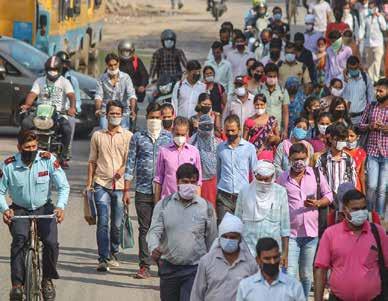
32
e-diaLogueS 40 Inadequate infra and negligence caused outburst of COVID in India
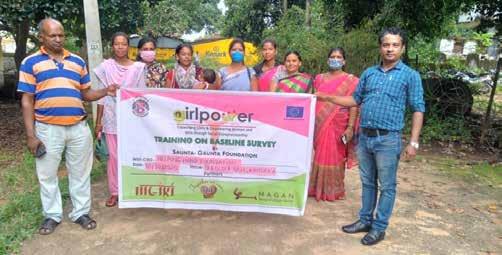
Girl Power Project Picks uP sPeed in jharkhand’s rural areas
After an immensely of the present conditions. To achieve technology, especially during this time successful video that, the Girl Power project, funded by of fear in the midst of a pandemic. conference-based the European Union and led by AIILSG, Partner meetings happen on video inauguration on Saunta Gaunta Foundation (SGF), conference and the twenty CSOs September 15, in the Magan Sanghralaya Samiti (MSS) and involved in the project are engaged presence of Badal Mahatma Gandhi Institute of Rural primarily through mobile phones and Patralekh, Minister Industrialization (MGIRI), designed a laptops. Each CSO is given a Google of Agriculture and baseline survey questionnaire targeting Form to fill information about women Animal Husbandry, Government of 5,000 women in the state of Jharkhand. entrepreneurs and policymakers Jharkhand, the Girl Power project has Wisely, SGF has chosen to train in their district. Whatsapp is the regained the post-COVID lockdown women to execute the survey, as the primary method for communication momentum. Launching the project on respondents are also women. Our field information. a virtual platform brought together an partner staff, Sebastian Soren, has been Similarly, the female surveyors are important solidarity among the teams, the lead trainer for the baseline survey using mobile phones to upload data for who are unable to meet in conferences of the community resource persons the survey, through a software that is physically due to COVID-19 (CRPs) of 20 civil society organizations completely free to the public. Though restrictions. (CSOs) in 10 districts of Jharkhand. We it has been a long time now since IT has
Nevertheless, across India, have come a long way from where we been hailed as a method for improving coronavirus lockdown regulations are started, when the CRPs were struggling rural livelihoods, there is no shortage of relaxing; one might say the country to download the app due to network new innovations and new applications is experiencing relief mixed with problems, and now in mid-October of the technologies. It remains to be apprehension and fear. Travel has when we have surveyed almost 1,500 seen how these surveys are uploaded opened up and in Jharkhand, the Girl women across the project area. and the kind of technological issues Power project’s partner Saunta Gaunta Women are leading this baseline that may take place in the future. Foundation (SGF) began executing a survey, as both surveyors and In addition to the collection of baseline survey. Other team members respondents. The information will information about women producers are working actively to investigate be captured across the 10 Girl Power and entrepreneurs in Jharkhand, the the appropriate training modules to districts in Jharkhand that promise to Girl Power team is also encouraging promote women’s entrepreneurship in reveal great insight into the potential CSO partners to meet with various Jharkhand. for entrepreneurship among women in government officials in their areas.
Prior to establishing a strategy for any this region. The meetings are taking place with project, there has to be an understanding All of us are heavily dependent upon full precautions and are proving to be a great way for the CSOs to get to know local officials and understand the kind of schemes available for women entrepreneurship in Jharkhand. Harnessing policymakers is an important sub-activity of the entire Girl Power project. There are various government schemes listed online to promote entrepreneurship, such as the Jharkhand State Livelihoods Promotion Society (JSLPS) of the State Rural Livelihood Mission, Skill Mission India, Startup India, Deen Dayal Upadhyay Grameen Kaushalya Yojana, and perhaps many more. Understanding which are active and can be harnessed
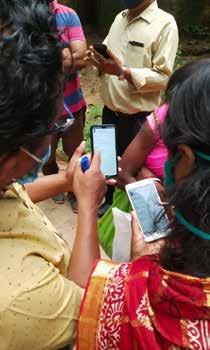
by the Girl Power project is the purpose of the meetings with the government.
While we seek to harness the government policies and schemes, we are also in the process of determining the actual requirements of the women of Jharkhand. Through the baseline survey, some in-house knowledge has developed on the kinds of products that can be harnessed for up-skilling and entrepreneurship. Bamboo handicraft, for instance, is commonly known by women in districts across Jharkhand, however, there is great potential for upgrading the handicraft skill through techniques and processing methods.
Women are locally producing baskets and other items and selling on a small
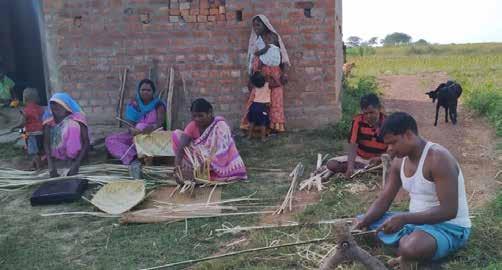
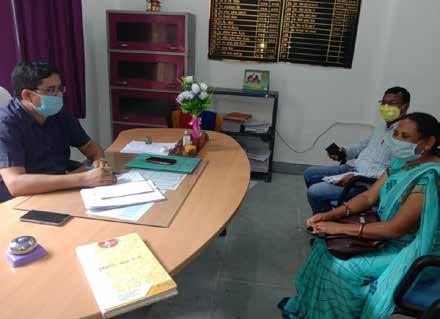
scale, yet it remains to be seen what the nature of the training module that the Girl Power partners will develop to bring their products to a wider market will be. Various retailers of women’s products have been identified by the Girl Power Market Connect team in Jharkhand, such as Jharcraft, Kusum Jharlac Emporium, Tribe Tree, Viponi, the Tribal Cooperative Marketing Development Federation of India (TRIFED), Shilpkaari and Chotanagpur Craft Development Society. Our hope is, in the long run, that Girl Power beneficiaries’ products can reach the showrooms of these various handicraft shops. The Girl Power project has an ambitious goal: establish 1,000 women entrepreneurs across Jharkhand. However, the project is set up to sequentially achieve this: first, through capacity building of CSOs who work with women, second, by creating a network of CSOs to pass along information, third, to train women on relevant skills with the help of the CSO network. Once women have received these trainings and upgraded their skills or learned new technologies, such as button mushroom cultivation, bamboo handicraft, lac jewelry production or medicinal plant processing by moving sequentially through the activities, while also developing partnerships with the government, the project team members will slowly understand how this connection to the market will take place.
“The theme of this project is partnerships,” said Pashim Tiwari, Technical Director, AIILSG. Developing partnerships in the field with 20 CSOs with the guidance of four esteemed and experienced nongovernmental organizations (NGOs), AIILSG, MSS, MGIRI and SGF. Our greatest and most important challenge is to reduce barriers to communication among all the partners and ensure that the information, training modules or market access becomes available to a wide network of CSOs, SHGs and women entrepreneurs in Jharkhand.
MoHUA celebrates ‘Swachhata ke 6 Saal, Bemisaal’ of SBM-U
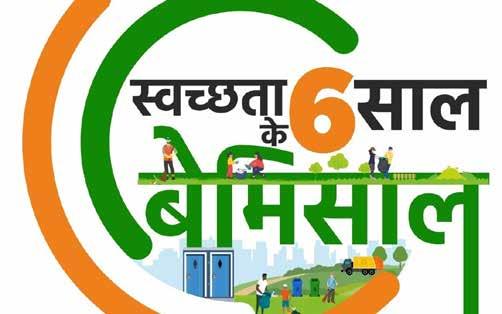
NEW DELHI: Ministry of Housing and Urban Affairs (MoHUA) organised a Webinar titled “Swachhta ke 6 Saal, Bemisaal” on October 2 to celebrate six years of the Government of India’s Swachh Bharat Mission. The celebrations were led by Hardeep Singh Puri, Minister of State (Independent Charge), MoHUA, along with Durga Shanker Mishra, Secretary, MoHUA, and Shri Kamran Rizvi, Additional Secretary, MoHUA. Puri released a dynamic Geographic Information System (GIS) portal showing different innovative practices of Solid Waste Management (SWM) from various parts of the country. He also released a document on Response of Indian Cities Towards COVID-19 and with the ‘Frontline Stories of Resilience: India’s Sanitation Champions’ prepared by the National Institute of Urban Affairs (NIUA). It is a collection of inspirational stories of sanitation workers compiled by the National Faecal Sludge and Septage Management (NFSSM) Alliance and a Toolkit for Safety of Sanitation Workers prepared by Urban Management Centre (UMC).
The next half of the event focussed on sharing experiences, by selected states, of their past six years towards cleanliness and drawing the blue print of future steps towards “Swachhatam Bharat”.
SBM-U was launched in 2014 and has done significant work towards cleanliness and SWM with around 4327 Urban Local Bodies (ULBs) declared Open Defecation Free (ODF) so far. Around 66 lakhs household toilets have been constructed till now across the country, thereby surpassing the mission’s target. Moreover, a total of 1,319 cities have been declared ODF+ and 489 cities are in ODF++ category. According to the data GCC introduces Madras Waste Exchange Award for the Best City in ‘Innovation and Practices’ (more than 40 lakh population) was given to Urban Local Body (ULB) of Greater Chennai for The Madras Waste Exchange (online platform). The Greater Chennai Corporation (GCC) has Resource Recovery Centres (RRC) and Micro Compost Centres (MCC) across Chennai. RRC segregates waste collected from houses and markets while MCC produces compost from the wet waste. However, the segregated waste from RRC was not getting a good value in the market. Through the online platform, the government aims to bridge the gap between supply and demand of segregated waste from RCC. The Exchange Platform acts as a connection between three entities: Greater Chennai Corporation with buyers of waste, Non-government entities like school, college, office and bulk waste generators with buyers and Greater Chennai Corporation with non-government entities.









